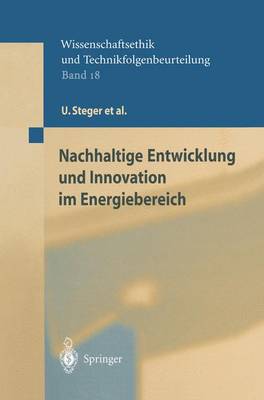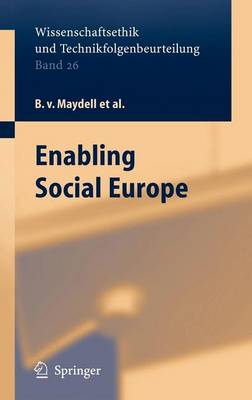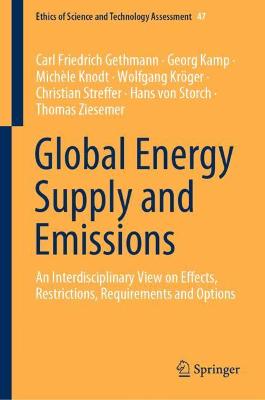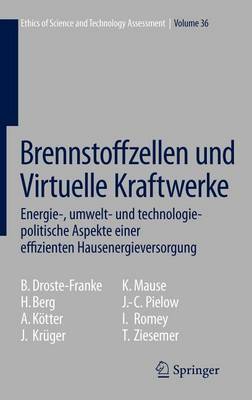Ethics of Science and Technology Assessment
9 primary works • 10 total works
Book 7
Humangenetische Diagnostik
by C R Bartram, J. P. Beckmann, F Breyer, G Fey, C Fonatsch, B Irrgang, J Taupitz, K -M Seel, and F Thiele
Book 18
Nachhaltige Entwicklung und Innovation im Energiebereich
by U. Steger, W Achterberg, K. Blok, H Bode, W Frenz, C Gather, G. Hanekamp, D Imboden, and M Jahnke
Fast alle Energieszenarien stützen sich auf Trends, die auf ein enormes Wachstum des Energiebedarfs in den nächsten Jahrzehnten hinauslaufen. Auf internationalen Konferenzen beschäftigt man sich indes mit dem Gegenteil: einer massiven Verringerung der Treibhausgasemissionen, vor allem der durch den Verbrauch von Energie verursachten CO2-Emissionen. Experten verweisen auch auf das politische Risiko der Abhängigkeit vom Erdöl und die Erschöpflichkeit von Ressourcen. Wie soll diese Kluft überbrückt werden? Wie lässt sich das bestehende Energiesystem nachhaltiger gestalten? Die Hoffnungen richten sich vor allem auf den technischen Fortschritt und Innovationen. Bislang liegen jedoch keine konkreten Vorschläge vor, inwieweit Innovationen tatsächlich dazu beitragen können, einen ständig wachsenden Energieverbrauch mit den Limitierungen im Hinblick auf die Ressourcenverfügbarkeit und die Umwelt sowie den strukturellen Anforderungen an ein Energiesystem in Einklang zu bringen. Die vorliegende Studie führt wirtschaftswissenschaftliche, juristische, naturwissenschaftliche und philosophische Kompetenzen im Hinblick auf derartige Vorschläge zusammen. Aufbauend auf einer soliden Rekonstruktion der mitunter verwirrenden Vielfalt der Begriffe werden Beurteilungen des bestehenden Energiesystems vorgelegt und Nachhaltigkeitspotenziale aufgezeigt. Die strategisch gebündelten Handlungsempfehlungen berücksichtigen die vielfältigen Zielkonflikte umwelt- und energiepolitischen Handelns und werden durch Implementierungsvorschläge ergänzt.
Book 26
Enabling Social Europe
by K Borchardt, K -D Henke, R Leitner, R Muffels, M Quante, P -L Rauhala, G Verschraegen, M Zukowski, and Mader Katharina
'Enabling Social Europe' examines how the paradigm of the 'enabling welfare state' might offer a new perspective for European social policy in the decades to come. The 'enabling' concept is perceived as going beyond that of mere 'activation', thus also embracing policies aimed at increasing personal autonomy, individual responsibility and social inclusion by endowing individuals with the resources and capabilities needed to manage and balance their life courses in a better way.
The study is distinguished by a unique collaboration of social and economic policy experts coming from a wide range of disciplines: economics, law, sociology, political science, and philosophy. The authors seek to shed new light on whether European social policy ought to play a role in the future and, if so, what sort of role that could be. They convincingly argue that despite an implicit normative consensus on the 'European social model', there is still room for a multifaceted world in which welfare regimes can maintain their own path-dependent ways of achieving a fair and just society with a high level of welfare for all.
The empirical part of the book contains an appraisal of policies and reforms with a view to the 'enabling welfare state' approach in four important policy areas: health care, old-age security, family policy, and poverty prevention. Within each sector, the authors compare the policies and practices of two countries attributable to different regime types: Germany and the United Kingdom, Poland and Germany, Finland and Estonia, and Belgium and Denmark.
This book is highly recommendable not only for scholars and policymakers active in this field, but also for students of welfare and labour economics, sociology, social policy, political science and law.
Book 36
Brennstoffzellen Und Virtuelle Kraftwerke
by Bert Droste-Franke, Holger Berg, Annette Ktter, Jrg Krger, Karsten Mause, Johann-Christian Pielow, Ingo Romey, and Thomas Ziesemer
Die interdisziplinare Forschungsarbeit verknupft Aspekte aus Energietechnik, Technikfolgenanalyse, Politikwissenschaft, A-konomie und Rechtswissenschaft miteinander und richtet sich an Wissenschaft, Politik, Akteure in der Energiewirtschaft sowie an die interessierte A-ffentlichkeit.
Book 40
Balancing Renewable Electricity
by Bert Droste-Franke, Boris P. Paal, Christian Rehtanz, Dirk Uwe Sauer, Jens-Peter Schneider, Miranda Schreurs, and Thomas Ziesemer
The study introduces technologies that can balance electricity in energy systems and that can serve as enabling technologies for the integration of large quantities of renewable energies in the power supply system. It begins with a discussion of normative aims for the future electricity system before continuing with a description of current policies and political developments and an overview of relevant existing energy system studies. These sections serve as background for the remainder of the study. They are followed by discussion and analysis of the growing demand for means to balance the fluctuations found in electricity generated in power systems with a high penetration of renewable energies, the potentials of diverse technologies, requirements for electrical networks, economic impacts and important legal issues. Finally, the main challenges to the achievement of developing balancing technologies and processes for renewable electricity-dominant systems are summarised and recommendations made.
Book 42
Improving Energy Decisions
by Bert Droste-Franke, M. Carrier, M. Kaiser, Miranda Schreurs, Christoph Weber, and Thomas Ziesemer
The main foci of the book are, thus, to develop an understanding about the specific challenges of the scientific policy advice in the area, to explore typical current approaches for the analysis of future energy systems and to develop criteria for the quality assessment and guidelines for the improvement of such studies.
The book provides assistance to the interpretation of existing studies and guidelines for setting up and carrying out new analyses as well as for communicating and applying the results. Thereby, it aims to support the involved actors such as the respective scientific experts and researchers as well as decision makers, energy suppliers, stakeholders and the interested public in designing procedures for a successful transition process. The study elaborates consistent interdisciplinary advice as contribution for realising a continuously safe and secure, long-term viable energy supply in spite of diverse interests, multi-level responsibilities, multi-dimensional processes, large uncertainties and lack of knowledge about future developments.
Book 43
Interdisciplinary Research and Trans-disciplinary Validity Claims
by C. F. Gethmann, M. Carrier, G. Hanekamp, M. Kaiser, G. Kamp, S Lingner, M Quante, and F Thiele
The present book is written by experts and practitioners of interdisciplinary research and policy advice. It analyses topical and methodological approaches towards interdisciplinarity, starting with the current role of scientific research in society. The volume continues with contributions to the issues of knowledge and acting and to trans-disciplinary deliberation. The final conclusions address the scientific system as substantial actor itself as well as the relevant research and education politics.
Book 47
Global Energy Supply and Emissions
by Carl Friedrich Gethmann, Georg Kamp, Michele Knodt, Wolfgang Kroeger, Christian Streffer, Hans von Storch, and Thomas Ziesemer
This book offers an authoritative analysis of the state-of-the art in energy and climate research and policy. It starts by describing the current status of technologies that are expected to have an influence on the energy systems of the future. For an adequate evaluation, it presents the latest findings on the effects of energy supply and consumption as well as of the emissions on both the environment and people's health. This is followed by an extensive discussion of the economic and social problems related to climate change, the need for energy transitions, and other issues that may require public investment and international agreements. The book reviews the problem of energy policy from a global perspective, providing readers with the technical, political, economic and ethical background needed to understand the current situation and work at better solutions for a sustainable, just and prospering world.
Book 48
Kunstliche Intelligenz in der Forschung
by Carl Friedrich Gethmann, Peter Buxmann, Julia Distelrath, Bernhard G Humm, Stephan Lingner, Verena Nitsch, Jan C Schmidt, and Indra Spiecker









